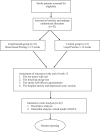The effectiveness of home-based therapy on functional outcome, self-efficacy and anxiety among discharged stroke survivors
- PMID: 33217861
- PMCID: PMC7676535
- DOI: 10.1097/MD.0000000000023296
The effectiveness of home-based therapy on functional outcome, self-efficacy and anxiety among discharged stroke survivors
Abstract
Introduction: Stroke survivors are commonly at risk of functional decline following discharge from rehabilitation, which increase their susceptibility to falls, dependency in activities of daily living and emotional disturbances. To combat these, continued therapy is important. Home-based therapy (HBT) has been shown to be useful in maintaining functional performance and quality of life of chronic stroke survivors. However, evidence on its effectiveness remains limited, while no studies are available to date which report the benefit of HBT on stroke survivors self-efficacy and emotional status. Therefore, this study aims to assess the effectiveness of post-discharge HBT in comparison to usual practice on functional outcome (mobility and gait speed), self-efficacy and anxiety level among stroke survivors.
Methods: This is an assessor-blinded randomized control trial comparing 2 types of intervention which are HBT (experimental group) and usual practice (UP) (control group). Based on sample size calculation using GPower, a total number of 42 participants will be recruited and allocated into either the HBT or the UP group. Participants in HBT group will receive a set of structured exercise therapy consisting of progressive strengthening, balance and task-related exercises. While participants in UP group will receive a usual "intervention" practised by rehabilitation professional prior to discharging stroke patients from their care. Both groups are advised to perform the given interventions for 3 times per week for 12 weeks under the supervision of their caregiver. Outcomes of interventions will be measured using timed up and go test (for mobility), ten-meter walk test (for gait speed), stroke self-efficacy questionnaire (for self-efficacy) and hospital anxiety and depression scale (for anxiety level). All data will be analyzed using descriptive and inferential statistics.
Discussion: This study will provide the information on the effectiveness of HBT in comparison to UP among stroke population who are discharged from rehabilitation. Findings from the study will enable rehabilitation professionals to design effective discharge care plan for stroke survivors in combating functional decline when no longer receiving hospital-based therapy.
Trial registration: Australian New Zealand Clinical Trials Registry, ACTRN12619001182189 (last updated 22/11/2019).
Conflict of interest statement
The authors report no conflicts of interest.
References
-
- Feigin VL, Norrving B, Mensah GA. Global burden of stroke. Circ Res 2017;120:439–48. - PubMed


